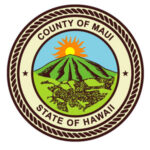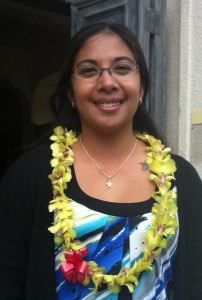
Nov 7, 2012 | Education

Chelsea Fernandez, veteran and owner of the Maui-based assistive technology company, FernanTECH.
The “Women of Power Stand Down” event is being held for women who have served in the U.S. military. “Stand Down” is a military term to describe a safe position off of the combat zone where weary soldiers can retreat to rest, re-boot and re-energize. Likewise, Women of Power Maui Stand Down will ignite positive change for women service members through the stories and lessons learned of other women.
The event is free for all women veterans living on Maui, Moloka‘i or Lana‘i. Special travel scholarships are available for women veterans who live on Moloka‘i or Lana‘i. The cost to non-military is $25. It’s the first time a Women of Power Stand Down event has been held in Maui County and the half day event kicks off a weekend of activities to celebrate Veterans Day. Focus is on sharing key strategies to help women vets find rewarding jobs or to get promoted. A special interactive session on networking skills will be followed by a Tech Talk Story panel and the opportunity to meet others with similar experiences and interests.
Event partners are theStrategist, a leader in healthcare design and innovation, Women in Technology, a project of MEDB, FernanTECH, a veteran-owned, Maui-based assistive technology company, and the Maui Business & Professional Women’s organization. Feedback from women veterans who attended the Women of Power Stand Down in Honolulu in July 2012 described the event as very informative, motivating and inspirational for women vets. One participant commented, “I was totally enamored by all the guest speakers and their trials and tribulations to be successful in their chosen vocations. They inspire me to keep striving for my goals and never give up.”
What: “Women of Power Stand Down” event
When: Friday November 9th, 9 a.m. to 1 p.m.
Where: MEDB’s Malcolm Training Center, 1305 N. Holopono Street
in the Research & Tech Park, Kihei
Cost: Free to all female veterans, with travel scholarships for Molokai and Lanai
RSVP: womenofpowermaui2012.eventbrite.com or call 808.875.2341
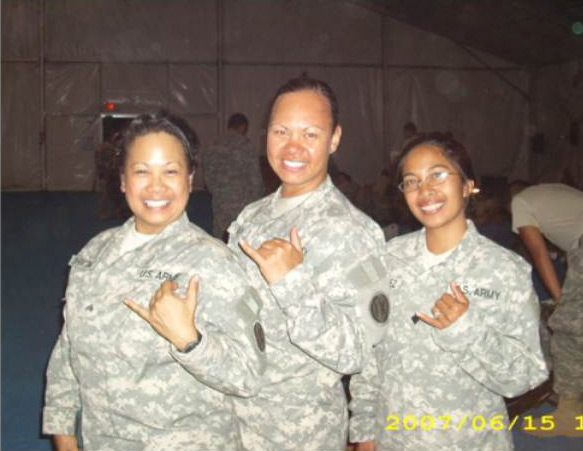
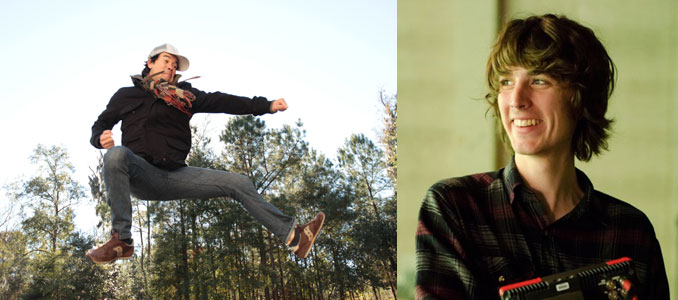
Oct 10, 2012 | Education

Filmmakers Destin Cretton (left) and Shan Liljestrand (right)
Two filmmakers with Maui ties will have their work showcased this month at the 2012 Hawai‘i International Film Festival on Oahu. The event, featuring more than 150 films from 40 different countries, is set for Oct. 11-21 at Regal Dole Cannery Stadium 18 Theatres & IMAX and the Hawai‘i Theatre. The festival bills itself as a premier international film event with two mandates: “to be a festival of record for emerging films from Asia and the Pacfiic, and to present the top festival films from around the world.” For more information, go to www.hiff.org.
Entries of interest include features by 33-year-old filmmaker and teacher Destin Cretton and 22-year-old cinematographer Shan Liljestrand. Both men grew up on Maui, were educated in schools here and now make Los Angeles their home. They also share a passion for filmmaking. “I love working in an art form that requires so much collaboration with other people,” said Cretton, whose festival film title is “I Am Not a Hipster.” It’s about a young singer-songwriter in San Diego who is learning to deal with the loss of his mother. There are five live music performances in the film, which all interact with the story and elaborate the characters. Liljestrand’s first entry at the Hawaii Film Festival is called “‘Ape,” the name of a plant used by Native Hawaiians as a test to determine if someone was real or a spirit. The subject in the film is Daniel, a young man who suffers from mental illness and travels to Hana in a form of self-therapy, but once there, reality fades further away. “Making this film was a great education as I am constantly learning to make movies,” Liljestrand said.
Asked to give advice to young people interested in filmmaking, Cretton said, “Just find a story that is close to you and figure out a way to tell it. Maui locals are natural masters of the craft so if that’s what you’re interested in, just go for it.” Liljestrand added, “It all boils down to telling a story, so write, draw, take photographs, whatever you can do to tell a story.”
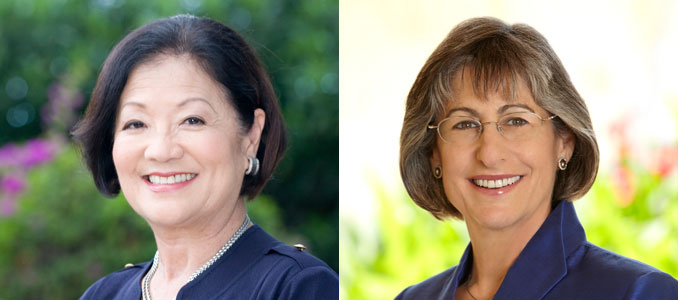
Oct 3, 2012 | Education
 Voters have an opportunity on Nov. 6 to elect a woman to replace retiring Hawaii U.S. Sen. Daniel Akaka. The race for the U.S. Senate seat features Democratic Congresswoman Mazie Hirono and former Republican Gov. Linda Lingle. Hirono is giving up her seat as the Hawai‘i 2nd Congressional District representative in the U.S. House of Representatives while Lingle is seeking to get back into political office two years after completing two terms as governor of Hawai‘i. The candidates have jointly agreed to participate in four statewide televised debates in October. These particular forums provide a chance for viewers to see the candidates together on one stage discussing their stance on the islands’ most critical issues and what they would do to address them if elected.
Voters have an opportunity on Nov. 6 to elect a woman to replace retiring Hawaii U.S. Sen. Daniel Akaka. The race for the U.S. Senate seat features Democratic Congresswoman Mazie Hirono and former Republican Gov. Linda Lingle. Hirono is giving up her seat as the Hawai‘i 2nd Congressional District representative in the U.S. House of Representatives while Lingle is seeking to get back into political office two years after completing two terms as governor of Hawai‘i. The candidates have jointly agreed to participate in four statewide televised debates in October. These particular forums provide a chance for viewers to see the candidates together on one stage discussing their stance on the islands’ most critical issues and what they would do to address them if elected.
The four Hirono-Lingle debates are scheduled for:
- October 8, 7 p.m., on KHON, sponsored by AARP.
- October 16, 8 p.m. on KITV, sponsored by Civil Beat.
- October 18, 8 p.m., on PBS Hawaii.
- October 22, 8 p.m., on Hawaii News Now, sponsored by the Honolulu Star-Advertiser.
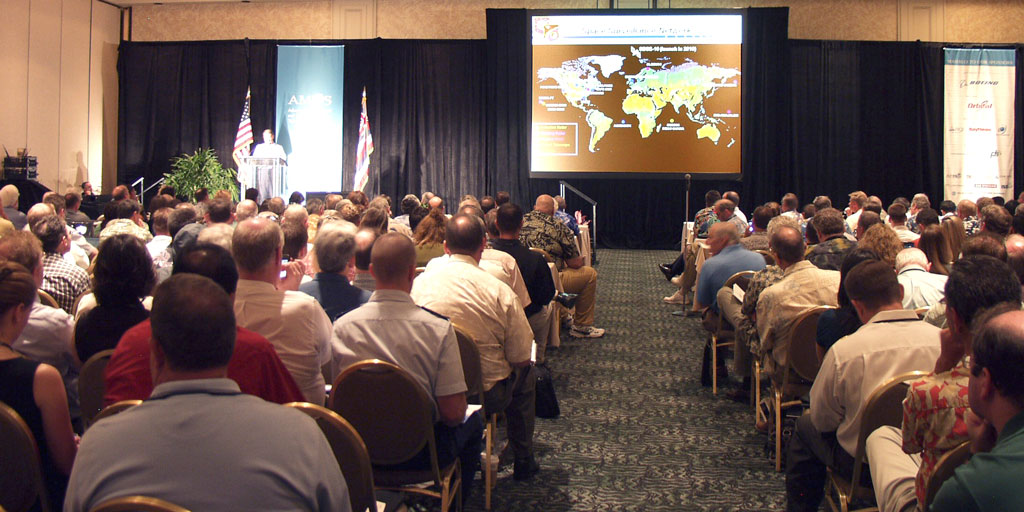
Sep 12, 2012 | Education, Environment
 Hundreds of scientists, astronomers, engineers and a new generation of space leaders are gathering on Maui this week for the 13th Advanced Maui Optical and Space Surveillance Technologies Conference. Mike Maberry is among six representatives from the University of Hawai‘i Institute for Astronomy who will be attending the 2012 event at the Wailea Beach Marriott Resort and Spa. “The AMOS Conference is the only annual world class space related technical conference held here in Hawai‘i,” said Maberry, assistant director for UH’s Institute for Astronomy. “It provides a great opportunity to network, to exchange ideas, and to get updates on advances in areas of technical interest.”
Hundreds of scientists, astronomers, engineers and a new generation of space leaders are gathering on Maui this week for the 13th Advanced Maui Optical and Space Surveillance Technologies Conference. Mike Maberry is among six representatives from the University of Hawai‘i Institute for Astronomy who will be attending the 2012 event at the Wailea Beach Marriott Resort and Spa. “The AMOS Conference is the only annual world class space related technical conference held here in Hawai‘i,” said Maberry, assistant director for UH’s Institute for Astronomy. “It provides a great opportunity to network, to exchange ideas, and to get updates on advances in areas of technical interest.”
A program of the Maui Economic Development Board, the AMOS Conference is billed as the premier technical conference in the nation devoted to space surveillance. The mission of MEDB, which is celebrating its 30th anniversary this year, involves taking innovative actions that strengthen existing industry and diversifying new opportunities. Maberry said the IfA has been participating in the conference since its inception. He said he attends to represent the IfA for networking opportunities “that may lead to collaborations for dual use technology development.” Scientists from the IfA have written several technical papers ‒ this year being no exception ‒ to share with others attending the conference.
The University of Hawai‘i Institute for Astronomy is the steward of two of the best astronomical and space surveillance observatory sites in the world, Haleakalā on Maui and Mauna Kea on the Big Island. Maberry said the AMOS conference helps keep him updated on the latest in space surveillance. This year’s keynote address will be given by General William L. Shelton of the Air Force Space Command, U.S. Air Force. Also, the conference will host up to 300 Maui middle school students for a session with Leroy Chiao, a former NASA astronaut and Space Foundation Special Advisor – Human Spaceflight. For more information, visit www.amostech.com.
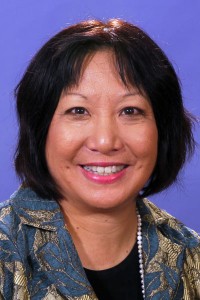
Aug 15, 2012 | Education, Stemworks
 Three months into the job and already Maui Electric Co. (MECO) President Sharon Suzuki has thrown her and her company’s support behind Science, Technology, Engineering and Math or STEM education projects. “Empowering our future leaders with strong skill sets in STEM-related disciplines is crucial to realizing our clean energy goals,” Suzuki said. “MECO strongly supports STEM-driven programs that engage and encourage Hawaii’s youth to achieve academic excellence.”
Three months into the job and already Maui Electric Co. (MECO) President Sharon Suzuki has thrown her and her company’s support behind Science, Technology, Engineering and Math or STEM education projects. “Empowering our future leaders with strong skill sets in STEM-related disciplines is crucial to realizing our clean energy goals,” Suzuki said. “MECO strongly supports STEM-driven programs that engage and encourage Hawaii’s youth to achieve academic excellence.”
Suzuki’s remarks back MECO’s role as a principle sponsor at the upcoming Maui Economic Development Board Ke Alahele Education dinner. The event raises thousands of dollars to support MEDB’s STEM education initiatives. Suzuki said she and her staff merge science and technology, engineering and math to get their jobs done and provide the island its energy resources. “At the heart of our company is innovation in STEM applications that are foundational as we transition from oil to clean sources of energy,” Suzuki said. A graduate of Castle High School on Oahu, Suzuki is a certified energy manager with a Master of Business Administration degree in Finance from California State University at Fullerton and a Bachelor of Arts in Economics and Japanese from the University of Michigan. Prior to becoming president, Suzuki served as MECO’s manager of renewable energy services and worked as its manager of customer service. At Hawaiian Electric Co., Suzuki was employed as the director of customer account services and manager of their energy efficiency program.
Hundreds of STEM supporters have already reserved seats at the annual Ke Alahele Education Fund dinner and auction on August 18 at the Grand Wailea Resort. Reception begins at 4:30 p.m. with dinner following at 6:30 p.m. For more information on the event, go to www.medb.org or call 875-2300. “The economic vitality of our Maui, Lana‘i and Moloka‘i communities determine the resiliency of our people. We believe in MEDB’s programs because they have proven results through young adults whose success is due in part to the opportunities provided by this organization,” Suzuki said.
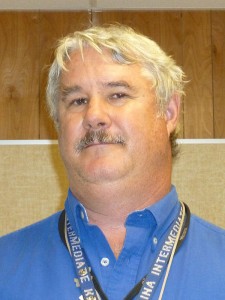
Aug 8, 2012 | Education
 Tom Norton inspires students intrigued by robots and colored plastic toy bricks to get them interested in the field of technology and creative learning. “You get ‘em hooked somehow,” said Norton, Lahaina Intermediate School’s technology coordinator. Norton exchanged his job as a math teacher a few years ago for his current role, taking charge of the campus’ technological needs and its teams of students competing in both robotics and the First Lego League competition. “It is something I enjoy,” he said. He said enrollment and interest in the elective technology class has increased from a dozen last year to about 17 students in just the first three days of this school year.
Tom Norton inspires students intrigued by robots and colored plastic toy bricks to get them interested in the field of technology and creative learning. “You get ‘em hooked somehow,” said Norton, Lahaina Intermediate School’s technology coordinator. Norton exchanged his job as a math teacher a few years ago for his current role, taking charge of the campus’ technological needs and its teams of students competing in both robotics and the First Lego League competition. “It is something I enjoy,” he said. He said enrollment and interest in the elective technology class has increased from a dozen last year to about 17 students in just the first three days of this school year.
Norton said he’s received professional training and support through workshops sponsored by Maui Economic Development Board. Because of the MEDB training, Norton said he’s found confidence in his role as coach for the robotics and Lego League teams who have earned spots in state level competition. Norton has also been effective in providing technical assistance and guidance whenever his 6th, 7th and 8th graders find roadblocks in tasks such as building robots or competing with Lego pieces. “I think you’d have a greater dropout from the adults,” Norton said, had the technical support from MEDB been unavailable. He said Lahaina Intermediate also received money from MEDB to order the school’s first set of robotic equipment about five years ago, as well as funds to offset travel expenses for offisland competitions.
In his role as coach and teacher, Norton said he subscribes to the philosophy “to let the kids do the work.” He steps in whenever students need guidance or get stuck on a technical problem. “I give them a lot of leeway to succeed — and also make mistakes,” Norton said. He said while students gain a lot of skills in technology, they also learn how to work together and how to be creative on projects from designing contest T-shirts to outlining presentations for judges. “This is a perfect opportunity for them to explore.” Tickets for MEDB’s annual Ke Alahele Education Fund dinner are available by calling 875-2300 or go to: www.medb.org. The benefit dinner is set for August 18 at the Grand Wailea Resort.
May 16, 2012 | Education
 Quintin Galiza has endured homelessness, the death of both parents and undue influence from troublesome friends to get to where he is today. He graduates with a high school equivalency diploma at this year’s Maui Community School for Adults commencement exercises. The 20-year-old from Kihei was homeless with his dad, going between stints in the family truck and friends’ homes last March when Galiza’s dad suffered a stroke and died. He lost his mother two years earlier following complications from abdominal surgery. “It’s been hard,” Galiza said. “I’ve had to figure things out on my own and I didn’t have a parent figure I could depend on.”
Quintin Galiza has endured homelessness, the death of both parents and undue influence from troublesome friends to get to where he is today. He graduates with a high school equivalency diploma at this year’s Maui Community School for Adults commencement exercises. The 20-year-old from Kihei was homeless with his dad, going between stints in the family truck and friends’ homes last March when Galiza’s dad suffered a stroke and died. He lost his mother two years earlier following complications from abdominal surgery. “It’s been hard,” Galiza said. “I’ve had to figure things out on my own and I didn’t have a parent figure I could depend on.”
Galiza sought government assistance to support him and his younger sister, Alyssa, a 17-year-old at the time. Alyssa has since been placed in foster care but Galiza maintains contact with her. She’s been his motivation to fend off an unhealthy lifestyle with troublesome friends. “I’m trying to be a good role model for my sister,” he said. In one year’s time, Galiza has taken classes that helped him pass tests required for a General Education Development diploma or GED. He’s also completed a semester of studies at the University of Hawaii Maui College and landed a job as a part-time cashier’s associate for a local pharmacy. Alyssa is following her brother’s footsteps with plans to enroll at the Maui Community School for Adults this summer so she can get the help she needs to earn her own GED. Galiza said he intends on pursuing a college degree.
Galiza’s scheduled to speak at the Maui Community School for Adults 45th commencement exercises set for 6 p.m., May 23, at the Baldwin High School Auditorium. More than 220 students have completed requirements for a GED and the Competency Based High School Diploma Program. Galiza said he expects to be filled with emotion on graduation day. “When I think back, there were days I would break down and cry. I just wanted to stay home… I never gave up. No matter what adversity, I never gave up.”
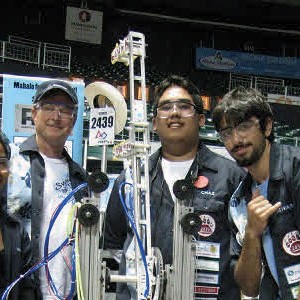
May 9, 2012 | Education

Students Brittany Nakagawa, Chaz Cabrero, Howard Andrade with mentor, Bob Brem.
Boeing Company‘s Senior Software Engineer Bob Brem has given as many as 200 hours of expertise this year as a mentor for the award-winning Baldwin High School robotics team. “I get a lot of satisfaction from it,” he said. “I think that we function as role models for students who see that there are rewarding careers available.” As a mentor in robotics, Brem helps with the configuration and setup of a robotics computer and software the Baldwin high schoolers put together for competition. He explains programming concepts and provides engineering guidance. In his three-year stint as a volunteer, Brem has obtained up to $15,000 in grants from Boeing to help the team with its expenses.
Baldwin High School industrial arts teacher and robotics lead advisor Gary Suter said Brem’s assistance is invaluable. “He keeps the kids engaged and gives them a good insight on what kind of future they could have.” This year the Baldwin High School robotics team was part of a three-team alliance that captured the first-place title at the FIRST Hawaii Regional Robotics Competition. Brem traveled with the students to the Mainland to represent Hawaii at a national competition. “Without his expertise, we’d really be hurting,” Suter said. The Baldwin team, nicknamed “Bearbotics,” was sponsored this year by the Maui Economic Development Board, Maui Electric Co., Boeing, BAE Systems, Textron, Warren S. Unemori Engineering, ROC Hawaii and the Monsanto Fund.
Brem said students (and their parents) show a lot of interest in learning more about science, technology, engineering and math. “These robotic programs generate enthusiasm and provide a start along the path toward a engineering/technical career, but in my opinion, they are not enough.” Brem said more support is needed to integrate engineering into the school curriculum. In addition, more mentors are needed for students engaged in science and engineering programs. Asked to give advice, Brem said: “When you find something you think you like, dive deeper and work hard at it. Nothing comes without effort. Work is not ‘work’ if you are doing something that you enjoy.”
Apr 11, 2012 | Education, Stemworks
 The third annual Hawaii STEM Conference drew 200-plus teachers and students to Maui and kicked off the state’s first Science, Technology, Engineering and Math Week. King Kekaulike High School teacher Emily Haines Swatek was grateful for the opportunity, bringing 10 students to the event held in Wailea in late March. “It’s so great to be exposed to all these different options in technology,” she said. This year’s conference brought students in from more than a dozen intermediate and high schools, teachers, parents, community and business members together with innovative companies including Google, National Geographic and Apple.
The third annual Hawaii STEM Conference drew 200-plus teachers and students to Maui and kicked off the state’s first Science, Technology, Engineering and Math Week. King Kekaulike High School teacher Emily Haines Swatek was grateful for the opportunity, bringing 10 students to the event held in Wailea in late March. “It’s so great to be exposed to all these different options in technology,” she said. This year’s conference brought students in from more than a dozen intermediate and high schools, teachers, parents, community and business members together with innovative companies including Google, National Geographic and Apple.
For many of the Hawaii STEM Conference attendees, this was their first experience at a regional technology conference complete with STEM breakout sessions, software competitions, an on-site 3C’s Digital Media competition and exhibits. Haines Swatek said the conference provided her a chance to learn more about what she can bring to the classroom. Amongst the things she’s prepared to use almost immediately from the conference are online Web design resources, ideas for 3-D modeling with the use of Google Earth, and online book publishing. “It’s amazing, there are so many things we can do,” she said. Her student, Lotus Chen, also found the conference beneficial. “I feel like it’s broadened my horizons,” Chen said. “There certainly was a lot to explore here.”
The 2012 Hawaii STEM Conference was sponsored by MEDB’s Women in Technology project in partnership with the County of Maui, and the Office of the State Director for Career and Technical Education. Haines Swatek said she expects to have “more inspired, more engaged” students now that they’ve been able to learn with other students from around Maui County and the state. “They’re fired up when they come back from something like this,” she said. Emily Schell of National Geographic also praised the event, “Hawaii educators and students have it going on! The stars are truly bright.”





 Voters have an opportunity on Nov. 6 to elect a woman to replace retiring Hawaii U.S. Sen. Daniel Akaka. The race for the U.S. Senate seat features Democratic Congresswoman Mazie Hirono and former Republican Gov. Linda Lingle. Hirono is giving up her seat as the Hawai‘i 2nd Congressional District representative in the U.S. House of Representatives while Lingle is seeking to get back into political office two years after completing two terms as governor of Hawai‘i. The candidates have jointly agreed to participate in four statewide televised debates in October. These particular forums provide a chance for viewers to see the candidates together on one stage discussing their stance on the islands’ most critical issues and what they would do to address them if elected.
Voters have an opportunity on Nov. 6 to elect a woman to replace retiring Hawaii U.S. Sen. Daniel Akaka. The race for the U.S. Senate seat features Democratic Congresswoman Mazie Hirono and former Republican Gov. Linda Lingle. Hirono is giving up her seat as the Hawai‘i 2nd Congressional District representative in the U.S. House of Representatives while Lingle is seeking to get back into political office two years after completing two terms as governor of Hawai‘i. The candidates have jointly agreed to participate in four statewide televised debates in October. These particular forums provide a chance for viewers to see the candidates together on one stage discussing their stance on the islands’ most critical issues and what they would do to address them if elected.





